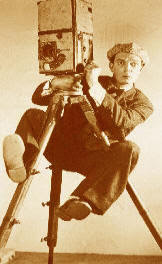 Note: This counts as Rating Game Redux 3
Note: This counts as Rating Game Redux 3Our local paper's latest open call for best-of lists is "Best Movie Directors." As always, we can list only three. ("Four shalt thou not count, neither count thou two, excepting that thou then proceed to three. Five is right out." Sorry; I had to finish it.) I like the restriction; it leaves one with a haiku-sharp sense of economy, plus the anguish of having left out so many more. I'm not sure if my picks and commentary are going to make it (my word count is a bit high this time around) so I will not waste--wanting is always another matter--but post them here. Argue all you like; I'll probably agree with you. (Yes, I'm talking to you, you
Truffaut
Bergman
Ozu
Coppola
Wilder
Lean
Ford
Renoir
Chaplin
Hitchcock
Kubrick
Kurosawa
-o-philes; you're as right as could be. Especially the last three. Of course.)
 Martin Scorsese
Martin Scorsese In the bomb-detonation business it's called a "controlled explosion": the bomb goes off, but only after the experts shoot at it or set off another bomb next to it or deflect the force of the explosion. This pretty much describes a Scorsese picture, as he manipulates the most incendiary human impulses with a master’s sure touch (and a mad bomber's glee), placing his actors--and us--just enough in harm's way to feel the heat of the blast but emerge in one piece (more or less).
 Orson Welles
Orson WellesHe made the best movie ever, then was punished for it the rest of his life. Prometheus, yes, but he invited his curse, and the tantalizing ruins he left behind--The Magnificent Ambersons, Macbeth, Mr. Arkadin, The Trial—as well as the still-standing monuments--The Lady from Shanghai, Touch of Evil--serve as remnants of an alternate movie-civilization in which Welles ruled, self-indulgent, -centered, and -satisfied, but never boring.
 Federico Fellini
Federico FelliniFrom his first film, Variety Lights (1950), to his last, Intervista (1987), Fellini calls our attention to a central truth of cinema: it is the most dream-like of the arts--that is, if one’s dreams are wish-fulfillments of cinema itself, watched in the dark but bathed in the glow of human memory and artifice, an imitation of "Action!" richer than the action itself. One part Da Vinci, one part P.T. Barnum, a master of mirror-writing and divine hokum, Fellini was God's jester, reminding Him that even forbidden fruit doesn't fall far from the Tree.
No comments:
Post a Comment